 MyDogBreeds
MyDogBreeds Tosa is originated from Japan but Gaddi Kutta is originated from India. Tosa may grow 11 cm / 5 inches higher than Gaddi Kutta. Tosa may weigh 46 kg / 102 pounds more than Gaddi Kutta. Tosa may live 3 years less than Gaddi Kutta. Tosa may have less litter size than Gaddi Kutta. Tosa requires Low maintenance. But Gaddi Kutta requires High maintenance
Tosa is originated from Japan but Gaddi Kutta is originated from India. Tosa may grow 11 cm / 5 inches higher than Gaddi Kutta. Tosa may weigh 46 kg / 102 pounds more than Gaddi Kutta. Tosa may live 3 years less than Gaddi Kutta. Tosa may have less litter size than Gaddi Kutta. Tosa requires Low maintenance. But Gaddi Kutta requires High maintenance
 Known also as the Japanese Mastiff, the Tosa hails from Japan. In fact, these dogs come from the Tosa Province, so the dog was named after the region where they were bred.
Known also as the Japanese Mastiff, the Tosa hails from Japan. In fact, these dogs come from the Tosa Province, so the dog was named after the region where they were bred.
It is why they are sometimes referred to as Japanese Mastiffs. The Tosa is a rare dog breed and unfortunately, the dog is still used in Japan for dogfighting.
The breed was developed in the 2nd half of the 19th century, with a number of dog breeds being involved to bring about a more powerful, braver dog.
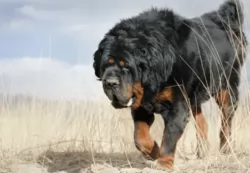 The Gaddi Kutta is mountain dog of the mastiff line from northern India. They are mostly found in the western Himalayas and Himachal Pradesh. It is also seen in Nepal and often named the Indian Panther Hound and the Mahidant Mastiff. They were bred to hunt but because of their strength and intelligence they are used to guard and herd goats and sheep. They are strong enough to defeat or scare off a panther or snow leopard and intelligent enough to work independently in finding strays and bringing them back to their pens. They have been known to protect herds of cattle from bears and leopards.3 or 4 of them working together can handle the guard duties for thousands of cattle.
The Gaddi Kutta is mountain dog of the mastiff line from northern India. They are mostly found in the western Himalayas and Himachal Pradesh. It is also seen in Nepal and often named the Indian Panther Hound and the Mahidant Mastiff. They were bred to hunt but because of their strength and intelligence they are used to guard and herd goats and sheep. They are strong enough to defeat or scare off a panther or snow leopard and intelligent enough to work independently in finding strays and bringing them back to their pens. They have been known to protect herds of cattle from bears and leopards.3 or 4 of them working together can handle the guard duties for thousands of cattle.
Their reputation precedes them – as ferocious and courageous, unmatched in their instincts to protect what is theirs. In the line of the Mastiffs and Molosser, the Gaddi is powerful and agile, and considered to be of ancient heritage though no one is sure what their origin is. The local myth is that dogs were crossed with tigers. It is more likely that dingo-like wild hounds from the Himalaya were crossed with the Tibetan Mastiff to create the Gaddi Kutti. Also found in Pakistan, most lines of the breed have been crossed with others including the German Shepard and the Bully Kutta. Outside of the Himalayas there are not many if any pure lines. The Gaddi Kutta is a good family dog if you socialize him as a puppy. He will be gentle, calm and intuitive with his family, but aggressive toward strangers and other dogs.
 The Tosa is a large dog, but their sizes vary, and in fact, because of their fighting, they are actually divided into light-, middleweight and heavyweight classes.
The Tosa is a large dog, but their sizes vary, and in fact, because of their fighting, they are actually divided into light-, middleweight and heavyweight classes.
Generally, you can say that these dogs weigh in the region of 54 to 90kg and they stand in height at between 62 to 82cm. The head is large, the jaws powerful, the eyes dark brown in color, the ears small, high set and floppy.
The neck is broad wit a dewlap and the tail is long, thick and tapering to a point. The coat is short and thick and is most times a rich caramel color, fawn tan, black or brindle. The dog often has a black mask.
The Tosa is a fairly quiet dog, courageous and fearless. He is going to need a strong, consistent owner who shows leadership with him. Training and socialization will be imperative for this dog.
When he has been properly reared and trained, he makes a good pet, able to get on with members of the family. He takes his role as protector and guardian seriously.
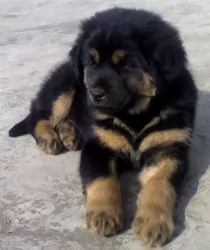 The Gaddi Kutta is a mastiff but he is athletic, has tremendous speed and stamina. He is muscular and deep-chested, leaner than most of the mastiff lines. Their ears can be either natural or cropped, on a very large head. One of the most important traits of the Gaddi Kutta is the massive, arched neck that protects them from predators. He is sturdy with a heavily feathered, thick tail curling over the back.
The Gaddi Kutta is a mastiff but he is athletic, has tremendous speed and stamina. He is muscular and deep-chested, leaner than most of the mastiff lines. Their ears can be either natural or cropped, on a very large head. One of the most important traits of the Gaddi Kutta is the massive, arched neck that protects them from predators. He is sturdy with a heavily feathered, thick tail curling over the back.
They are massive, wolf like dogs, fiery and huge but intelligent and faithful to their people. They are scary even when they are trying to be affectionate. The muzzle is strong, and the mane is thick. The Gaddi has long, heavy legs and very large feet that are feathered, making him even more intimidating.
There are two types of Gaddi Kutti – the longhaired and the shorthaired. The longhaired is the most common and has a fuller coat with long feathering on the tail, legs and chest and some feathering on the feet. They are all usually solid colors of yellow, fawn and cream or they could be piebald, brown or brindle. They have a woolly dense undercoat.
 The Tosa isn’t recommended for first-time dog owners, as in the wrong hands, they can become aggressive. Care has to be taken around children too especially undisciplined ones.
The Tosa isn’t recommended for first-time dog owners, as in the wrong hands, they can become aggressive. Care has to be taken around children too especially undisciplined ones.
He also doesn't come as recommended for small, cramped homes in the city. He’s just too big and he will need to get out and be walked often.
You want to create a home for him that ensures he is the calm, gentle dog he is capable of being, If you’re fair, firm, caring, patient and consistent, then this big dog might be for you. With the right care he becomes a gentle, devoted pet.
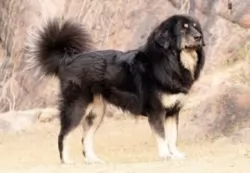 They are not always great with children, but they will protect own children in their family. Do not leave unattended.
They are not always great with children, but they will protect own children in their family. Do not leave unattended.
They have the ability to bring down a wolf or even a bear or snow leopard.
Because of his size, temperament and coat he is not very adaptable. He is good outside in a colder region and with a lot of land to roam, but not in a hot region or in an apartment.
This breed is very smart, learns quickly on his own.
 The Tosa is a formidable looking molossoid, but even so, this big, calm dog can succumb to illness. Some of these diseases you need to be looking out for include bloat,hip dyslasia and eye conditions.
The Tosa is a formidable looking molossoid, but even so, this big, calm dog can succumb to illness. Some of these diseases you need to be looking out for include bloat,hip dyslasia and eye conditions.
Bloat for this dog can be life-threatening, and can often be because the dog is too hungry and he gobbles up his food quickly. Bloat is when gas can't escape, the stomach swells and twists – very dangerous. Rather give your dog two smaller meals – one in the morning and one in the evening, or even give several smaller portions throughout the day.
To help with eliminating health issues always choose a reputable Tosa breeder. You’re not likely to find one of these dogs in a dog shelter.
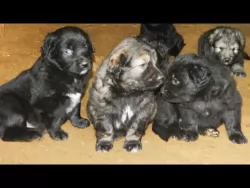 The breed is prone to obesity if they do not get enough exercise or a decent diet.
The breed is prone to obesity if they do not get enough exercise or a decent diet.
 These large, strong dogs do well on good quality food. If you opt to buy him commercially manufactured food, make sure it is the top quality one free of unwholesome ingredients such as preservatives, colorants and useless fillers.
These large, strong dogs do well on good quality food. If you opt to buy him commercially manufactured food, make sure it is the top quality one free of unwholesome ingredients such as preservatives, colorants and useless fillers.
Invest in the best quality ones that have nutritious minerals and vitamins. Try and give your dog some home-prepared food too – boiled chicken, brown rice or pasta, spinach, sweet-potatoes and carrots.
Never feed your dog things such as chocolates, peanuts, crisps, grapes, onion and food with spicy flavorings. This will just ensure digestive problems and having to get your dog to the vet.
The Tosa’s short coat isn’t going to require too much attention. A good brush twice a week will keep it free from loose hair and keep its shine and gleam. It’s why the dog is looked upon as being low maintenance.
Beyond that, he will need to have his nails trimmed. When brushing him, check him over for parasites – ticks and fleas, check for unusual lumps and look inside his ears for signs of redness.
These dogs are calm and fairly low-energy. Nonetheless, to maintain good health, he will need to be exercised. Ball games outside are always a good idea as well as nice long walks. Hikes into the countryside will be wonderful for this big dog.
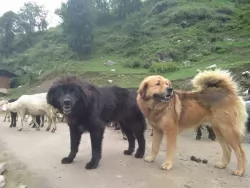 Should feed a high quality dry puppy food for large dogs. Give 1-2 cups per day split into 2-3 meals.
Should feed a high quality dry puppy food for large dogs. Give 1-2 cups per day split into 2-3 meals.
Again you want to feed high quality dry adult dog food for large dogs. Give 3-4 cups per day split into 2 meals. Watch for obesity and if your Gaddi Kutta is gaining too much weight, cut back.
The Gaddi Kutti seems to be immune to the most common of canine diseases.
This is a breed of very large dogs that need daily exercise by walking and running. However, since they have been fairly isolated in India and the Himalayas, he has not been exposed to organized dog play and exercise such as agility, dock jumping or field trials. He would probably succeed at all three.